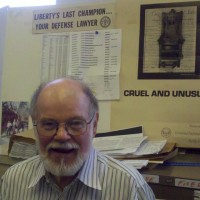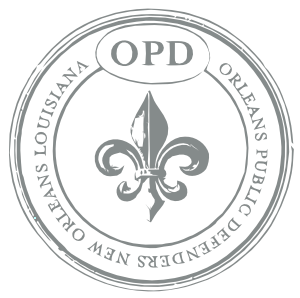US Supreme Court Fails the Sixth Amendent
Thoughts from Chief Defender Derwyn Bunton
"In all criminal prosecutions, the accused shall enjoy the right to a speedy and public trial ... and to have the Assistance of Counsel for his defense," the Sixth Amendment to the United States Constitution.
Recently the United States Supreme Court dismissed the case of Louisiana v. Boyer by a vote of 5-4. The case involved one of the most basic rights of due process – the above's right to a speedy trial and the effective assistance of counsel. At issue in Boyer was whether a state's failure to fund his counsel for five years should be weighed against the state for speedy trial purposes.
Fifty years after the landmark Gideon v. Wainwright ruling, the goal of equal justice under the law – embodied in the right to counsel – remains elusive at best. The Sixth Amendment right to counsel is jeopardized by a United States criminal justice system so lacking in funding for public defense that lawyers in public defender offices often qualify for public benefits. Ours is a system where public defenders (working a second job) encounter their clients while delivering pizza to them.
While the state of public defense funding is troubling in New Orleans, it is not a problem unique to New Orleans. Public defender offices across the state and country face increasing budget shortfalls and insufficient resources. Additionally, public defender caseloads regularly exceed professional and national standards for ethical representation. Neglecting the importance of adequately funded public defenders threatens the credibility and reliability of our criminal justice system, evidenced by 873 known exonerations between 1989 and 2012.
U.S. Attorney General Eric H. Holder Jr. said last year across the country, "public defender offices ... are underfunded and understaffed. Too often, when legal representation is available to the poor, it's rendered less effective by insufficient resources, overwhelming caseloads and inadequate oversight."
District Attorney's Fifteen Defendant Indictment Exposes OPD's Lack of Adequate Resources, Jeopardizing the Case
New Orleans – Yesterday, the district attorney handed down a 15 co-defendant indictment. The unprecedented number of group prosecutions is consistent with the Mayor's new Group Violence Reduction Strategy (GVRS). While the initiative is a commendable effort to address the city's violence, it stresses an already strained public defense office and criminal justice system.
Prosecuting so many people at once creates ethical conflicts in their defense. After sustaining millions of dollars in cuts over the past two years, the Orleans Public Defenders Office (OPD) simply does not have adequate resources to handle all charged. Many of the defendants may not have attorneys when proceedings begin unless they have money for private counsel.
Mayor Landrieu spoke about justice and fairness in his press conference this morning. But justice and fairness can only be served if all agencies are able to contribute to the discussion and able to handle the outcome of the initiatives. The GVRS strategy is placing great strain on our office and resources. Additionally, failing to include and consult OPD in developing or implementing the GVRS threatens to weaken or ruin the impact of GVRS efforts.
Gideon v. Wainwright, Fifty Years Later
Fifty years ago, the United States Supreme Court ruled in the landmark case, Gideon v. Wainwright, the right to a lawyer is fundamental, essential to a fair trial and cannot be denied. Moreover, the right means everyone is entitled to effective representation. The Orleans Public Defenders Office (OPD) strives each day to provide our clients zealous legal representation, breathing life into this constitutional guarantee.
It is hard to believe that within many of our lifetimes, legal representation was not a guarantee. This guarantee is often taken for granted today. Should we? Has the promise of full access to counsel, to justice really been fulfilled?
Restriction of Services Deja Vu
2013 began with an all-too familiar scenario: budget cuts and shortfalls. OPD once again found itself short of necessary funding to provide constitutionally-mandated legal defense for indigent defendants. Although OPD was included in the city's 2013 budget, the $400,000 appropriation cut, along with decreases in state funding and unstable revenue sources, hinder our ability to keep up with the growing demands of our criminal justice system.
While the Restriction of Services Plan this year will not be as drastic as 2012, it will cause delays in the courts and potential constitutional crises for the nearly 25,000 indigent defendants served by our office.
OPD represents over 80% of defendants in Criminal District court, most of the defendants in Municipal Court and many in Traffic Court. Hiring freezes, attorney shortages, rising caseloads and service restrictions are slowing case processing time, affecting the quality of service and jeopardizing the integrity of court proceedings, particularly in conflict representation and Municipal Court, both severely understaffed.
Attorney caseloads throughout all divisions are quickly rising beyond the state standards; most attorneys already exceed state standards. While the return of conflict representation in the Conflict Division in July 2012 was much-needed, its reduced capacity is not enough to adequately and ethically keep up with the demand. The situation in Municipal Court is also especially urgent as those attorneys are already above manageable levels.
While we are thrilled about our newly-created in-house Capital Division, we have been forced to slash the division's budget. As a consequence, OPD will not be in a position to handle any increase in capital prosecutions this fiscal year.
OPD continues to advocate for adequate and stable funding for public defense. The growing funding crisis compromises OPD's ability to provide constitutionally-mandated legal services, brings higher costs in our criminal justice system, and ultimately puts public safety at risk. We continue working with our partners and stakeholders in the hopes these service restrictions do not have to continue.
Justice Should Be a Reality, Not a Dream
“Injustice anywhere is a threat to justice everywhere,” said Martin Luther King, Jr. Nearly fifty years ago, Dr. King delivered his historic “I have a Dream” speech in Washington. He called for civil and economic rights – equality for all regardless of race, status and beliefs.
However, the fight for civil rights didn’t end with that speech. Injustice didn’t disappear with the end of segregation. Disparity still lingers in our criminal justice system. Poor people are incarcerated at a higher rate because they can’t afford bond, indigent defendants make up 80% of court dockets and public defense is significantly underfunded. Retrials, wrongful convictions and exonerations persist.
Many in our community haven’t been given a fair shot at life. Now is the time for this to change. Addressing education, mental health, rehabilitation, re-entry programs, employment and healthcare – and the connection to our criminal justice system – must be priorities if we ever hope to break the cycle of violence. Our clients are fighting for a chance in court, a second chance at life. Less known, our clients fight for a chance to prove they are better than the worst thing they’ve ever done and many times to prove their innocence – with only their public defender standing beside them.
We fight everyday for justice, for fairness in our criminal justice system and for those unjustly shut out of the process. Justice should never hinge on the amount of money in a man or woman’s pocket, or skin color, or even the side of the tracks they come from. Justice is demanded by our constitution. Justice is a human right, in and out of the courtroom. Justice should be a reality, not a dream, for all New Orleanians.
OPD Honors Clyde Merritt
 OPD recently honored one of the stalwart advocates for public defense, Clyde Merritt, with the eponymous "Clyde Merritt Award." The award, recognizing commitment and fight for the cause of indigent defense, was established this year in his honor and will be awarded annually.
OPD recently honored one of the stalwart advocates for public defense, Clyde Merritt, with the eponymous "Clyde Merritt Award." The award, recognizing commitment and fight for the cause of indigent defense, was established this year in his honor and will be awarded annually.
Mr. Clyde, as we called him, practiced law for 49 years, 12 years under former District Attorney Jim Garrison and 37 as a defense attorney, and was an inveterate part of OPD. He was always ready and willing to answer the call for his own clients, prep defense theories with other attorneys and talk about his past antics in the courthouse. He had a tenacity and command of the courtroom that just couldn't be taught. Mr. Clyde was the first person in the office and always the last one to leave. Weekends were just another day to work, often pajama-clad and with one of his beloved dogs in tow.
"You doing alright? Say yeah," greeted everyone he passed. Former colleagues remember his incredible knowledge of the law, and the oftentimes harsh reality of it, which gave him great empathy for his clients. Mr. Clyde really, truly cared about his clients and often went beyond the call of duty. He embraced the idea that he would go to jail for his clients, and often was held in contempt. That just simply was part of his role as an attorney.
Mr. Clyde embodied the concept of a public defender - to stand next to the person who has no one left to stand next to him. And Mr. Clyde did.
Read more about Mr. Clyde's life work at NOLA.com
